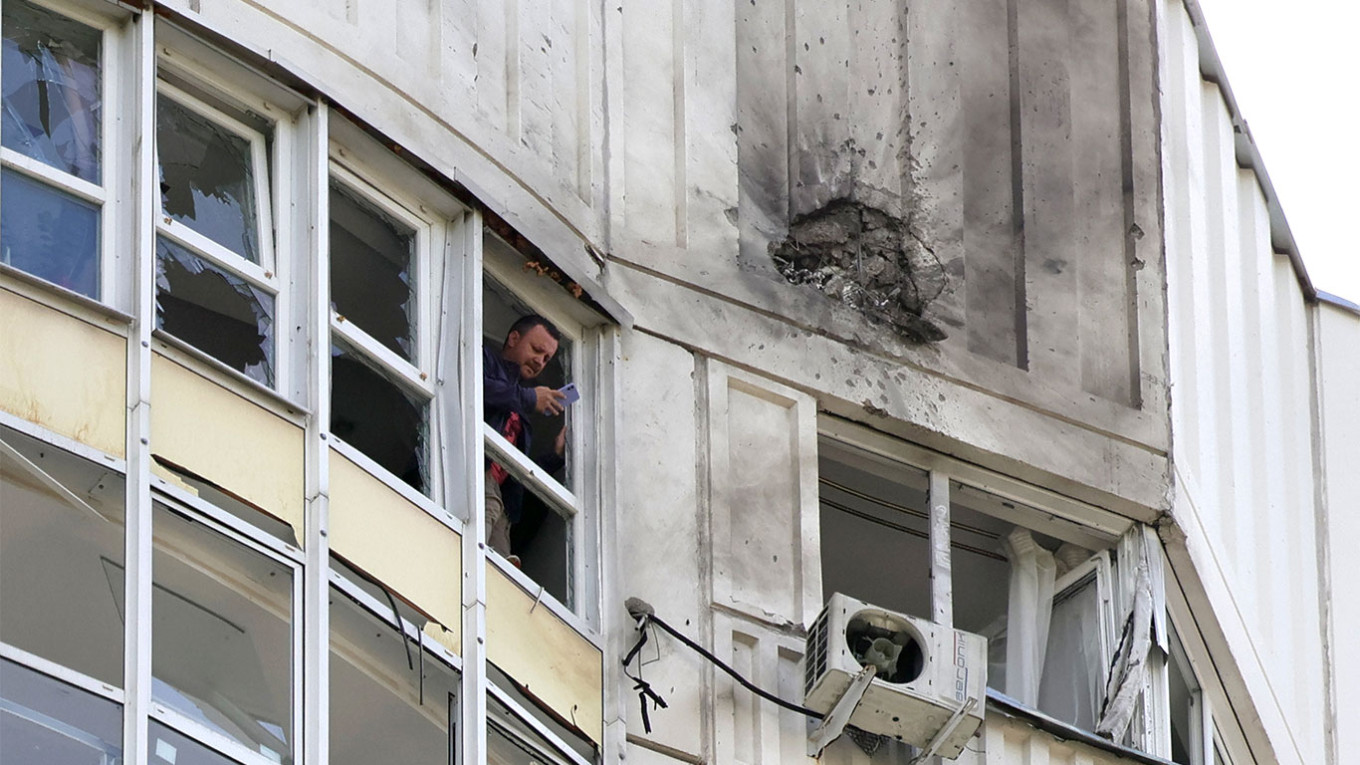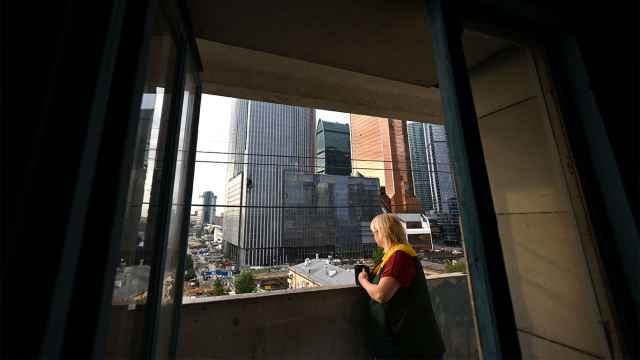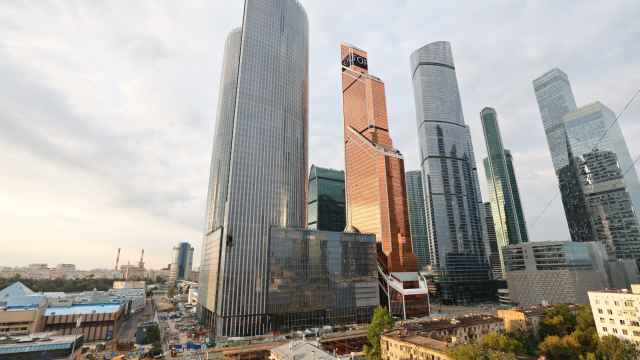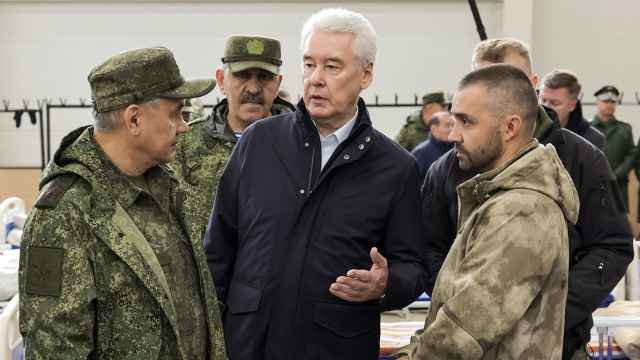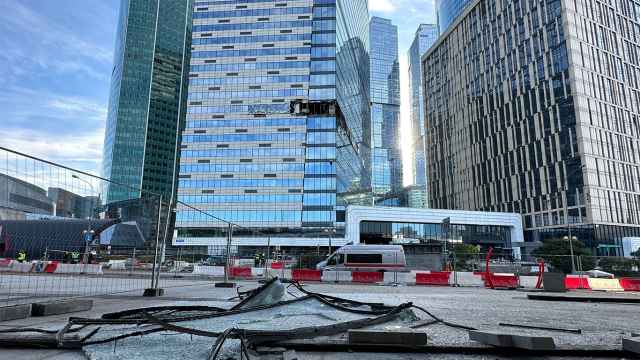Updated to add more details on the attacks, eyewitness accounts and context.
Moscow was targeted by a swarm of drones early Tuesday morning, marking the first time that unmanned aerial vehicles have struck residential areas of the Russian capital since the country’s full-scale invasion of Ukraine last year.
The attack on Moscow, located more than 1,000 kilometers from Ukraine, came as Kyiv was hit by another barrage of Russian drone strikes which left at least one person dead.
"This morning, at dawn, a drone attack caused minor damage to several buildings. All the city's emergency services are on the scene,” Moscow Mayor Sergei Sobyanin said.
No casualties were reported.
A female resident of one of the apartment blocks that was struck described hearing a “powerful” explosion.
“It was scary,” she told the RBC news website.
Another eyewitness told the independent TV channel Dozhd that there was an explosion at 4:20 a.m. and that the emergency services arrived within about 10 minutes.
The attack on Moscow comes as Russia’s Armed Forces brace for an imminent Ukrainian counteroffensive and it follows weeks of Russian attacks on the Ukrainian capital of Kyiv that have involved hundreds of missiles and drones.
The Kremlin said President Vladimir Putin was informed of the drone attacks in "real-time" by authorities including the Defense Ministry and Moscow Mayor's Office.
"It is completely clear that we are talking about response acts by the Kyiv regime to very effective strikes on a command center (in Ukraine)," Kremlin spokesman Dmitry Peskov said, without clarifying where the Russian strike took place.
"Thank God, there were no victims and there is no threat at the moment for residents of Moscow and the Moscow region," Peskov told reporters.
Putin later blamed the drone attack on “terrorist activity” and called it an attempt by Ukraine to “intimidate” ordinary Russians.
Images of Moscow posted on social media showed traces of smoke in the sky. Others showed a broken window and minor damage to buildings.
In one video, a downed drone was seen apparently exploding in a field in the Moscow region, creating a large fireball.
Russia’s Defense Ministry claimed that Kyiv had targeted Moscow with eight drones in what it said was a “terrorist attack.”
It said that three drones were taken down by jamming their control systems and another five were shot down with air defense systems.
“Several” drones were shot down on the approach to Moscow, the governor of the Moscow region wrote on Telegram.
Russian media reports suggested that up to 32 drones could have been involved in the attack.
Russia’s regions bordering Ukraine have faced repeated drone and shelling attacks since the Kremlin sent troops into its pro-Western neighbor, with military bases, oil refineries and other energy infrastructure the most frequent targets.
But incidents in Moscow have been rare given its distance from the frontline and significant air defenses.
Air defense systems were installed in the center of the Russian capital earlier this year, including on the top of the Defense Ministry headquarters, as concerns grew over Ukraine’s ability to strike deep within Russian territory.
This month, two drones were shot down over the Kremlin in what Moscow claimed was a Ukrainian assassination attempt against Putin.
Russian military experts and pro-war bloggers said that the drones used Tuesday were likely a new type of drone capable of flying long distances.
Ukraine has traditionally followed a policy of strategic ambiguity toward all attacks inside Russia, neither confirming nor denying involvement.
On Tuesday, Ukrainian presidential adviser Mykhailo Podolyak told Russian independent media that Kyiv had no connection to the aerial assault on Moscow, but added that “we are watching with pleasure — and we predict an increase in the number of attacks.”
The United States said that it does not back attacks inside Russia but said Russia bore responsibility for the war with Ukraine.
"As a general matter, we do not support attacks inside of Russia. We have been focused on providing Ukraine with the equipment and training they need to retake their own sovereign territory," a State Department spokesperson said as Secretary of State Antony Blinken visited Sweden.
Observers said the strikes were likely aimed at sowing fear ahead of Kyiv’s long-awaited counteroffensive.
“If the goal of the assault was to stress out the population, then Ukrainian drones appearing in the skies over Moscow have done enough,” prominent pro-war blogger Rybar wrote.
State Duma Deputy Alexander Khinshtein published a list of five sites where drones were apparently shot down, including the village of Razdory, which is several kilometers away from the elite suburb of Rublyovka where Putin has a residence.
Three high-rise buildings in southwest Moscow were damaged by drones, state-run news agency RIA Novosti reported, citing the emergency services.
The buildings included one near Leninsky Prospekt, a major artery into the city.
Sobyanin said later Tuesday that residents of the targeted buildings were starting to return to their homes after being evacuated.
The drone assault on Moscow follows a Russian overnight attack on Ukraine's capital of Kyiv, which left at least one person dead, according to the city's Mayor Vitali Klitschko.
Ukraine on Tuesday said it had downed 29 out of 31 Russian drones, mainly over Kyiv and the Kyiv region in the latest Russian barrage. This was the third major attack on Kyiv in just 24 hours.
Drone attacks by both sides have been a major feature of the fighting in Ukraine, but such incidents on Russian territory have increased in frequency in recent weeks.
There have been dozens of such attacks in Russia’s border regions, but drones have also targeted areas much more distant from Ukraine, including the northwestern Pskov region.
AFP contributed reporting.
A Message from The Moscow Times:
Dear readers,
We are facing unprecedented challenges. Russia's Prosecutor General's Office has designated The Moscow Times as an "undesirable" organization, criminalizing our work and putting our staff at risk of prosecution. This follows our earlier unjust labeling as a "foreign agent."
These actions are direct attempts to silence independent journalism in Russia. The authorities claim our work "discredits the decisions of the Russian leadership." We see things differently: we strive to provide accurate, unbiased reporting on Russia.
We, the journalists of The Moscow Times, refuse to be silenced. But to continue our work, we need your help.
Your support, no matter how small, makes a world of difference. If you can, please support us monthly starting from just $2. It's quick to set up, and every contribution makes a significant impact.
By supporting The Moscow Times, you're defending open, independent journalism in the face of repression. Thank you for standing with us.
Remind me later.


